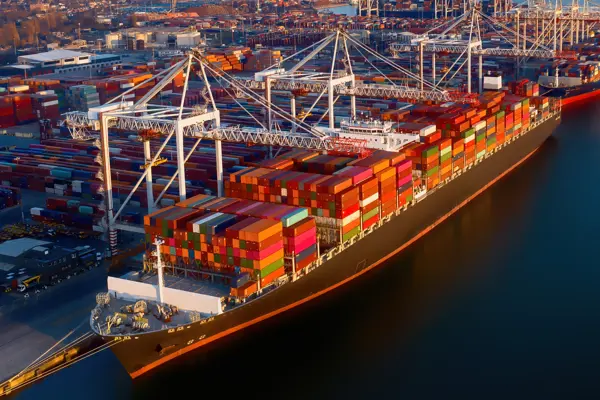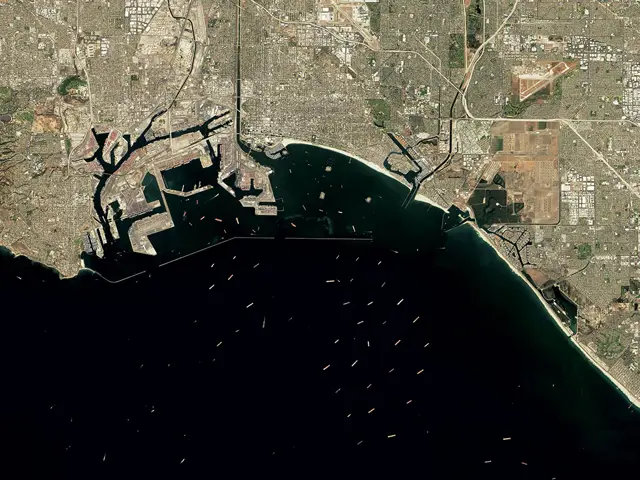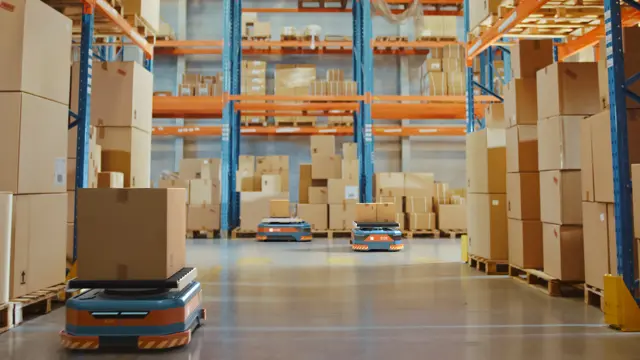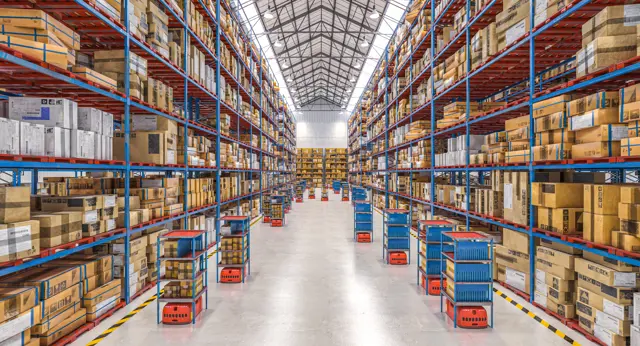Read more
More on supply chain challenges and solutions
Covid measures, war, resource and labour shortages herald the end of the globalised world as we knew it. You can’t always rely on cheaper suppliers based on other continents anymore, but you have to be able to deliver your products at the same low price. At the same time, interest rates are rising, inflation surging, and consumer confidence is falling. With knowledge and technology, you build a flexible supply chain that can handle this perfect storm.
Covid restrictions in China closing down factories, the war in Ukraine and turmoil around the globe are testing supply chains constantly. Most famous is perhaps the chip shortage that is preventing products from being sold or even sold unfinished, but the issue is much broader. Some companies interrupt entire production lines, while others are lucky if that one missing screw or chip doesn’t get in the way of the final product. Relying on one supplier is no longer enough; you have to be able to move quickly so that you avoid empty shelves of retailers and dealers. Problems in your supply chain are issues, but not being able to sell is catastrophic. So, what might you need to consider?
Are We Heading Toward the Deglobalisation of Logistics?
You have to redesign your supply chain, but there are consequences when you diversify your suppliers and start nearshoring. Pricing: Shifting the supply of components from China to Europe or the USA can easily result in a cost increase of 3-7 times. Consumers are still willing to pay higher prices. But, will they when energy bills and higher interest rates on borrowed money start to limit purchasing power?
Availability of capability: It is quite a search to find the right supplier for components that meet the quality and delivery time you seek. The question is whether you can find them closer to home at all.
Transportation: A final product with few components is easy to source. Many products quickly consist of hundreds of components, each with a specialised supplier. It usually takes years to build resilient supply chains which consist of preferred suppliers and backup suppliers.


You don’t want to put all your eggs in one basket. On the other hand, you want the best and most favourably priced components as soon as possible. Flexibility is essential to building a robust supply chain consisting of reliable suppliers and backups. A global ERP platform like Dynamics 365 can help in this transition.

One black hole in your supply chain can lead to unfinished products. You need visibility of key delivery dates, and you need to be able to move that date if needed. How long do you need to communicate to your supplier that you need to move the delivery dates and how many records do you need to update to make everybody else within the organisation aware of these delivery day changes? Realtime end-to-end-visibility from digital data is crucial from logistics information to pricing and quality control. Therefore, companies need to transform their fragmented systems into a single platform that gives actionable information instantly about inbound and outbound processes.

Do you know what’s happening now in your warehouses all over the world? What is the impact on your distribution? Dynamics 365 is beneficial in this international context. Having a distribution company and production on different continents means you cannot rely on emails or phone calls. Data on stock levels must be shared in real-time with each other and with dealers and shops across the world. For global companies, direct insight is of huge advantage resulting in at least 5% more efficiency.

Building a resilient, connected supply chain is not only a matter of implementing software. This is especially true for companies that operate in multiple countries, as everyone must be connected. HSO International only implements internationally. As a result, we not only know the local markets, but also the local laws and regulations. Are your business units in Sydney, Shanghai, São Paulo and Salzburg? We have a truly international team whose collective experience spans these markets and languages. Moreover, with one team, we keep everyone aligned. With no handoffs, a singular vision is implemented around the globe.

Feel free to contact us
Read more
More on supply chain challenges and solutions
We, and third parties, use cookies on our website. We use cookies to keep statistics, to save your preferences, but also for marketing purposes (for example, tailoring advertisements). By clicking on 'Settings' you can read more about our cookies and adjust your preferences. By clicking 'Accept all', you agree to the use of all cookies as described in our privacy and cookie policy.
Purpose
This cookie is used to store your preferences regarding cookies. The history is stored in your local storage.
Cookies
Location of Processing
European Union
Technologies Used
Cookies
Expiration date
1 year
Why required?
Required web technologies and cookies make our website technically accessible to and usable for you. This applies to essential base functionalities such as navigation on the website, correct display in your internet browser or requesting your consent. Without these web technologies and cookies our website does not work.
Purpose
These cookies are stored to keep you logged into the website.
Cookies
Location of Processing
European Union
Technologies Used
Cookies
Expiration date
1 year
Why required?
Required web technologies and cookies make our website technically accessible to and usable for you. This applies to essential base functionalities such as navigation on the website, correct display in your internet browser or requesting your consent. Without these web technologies and cookies our website does not work.
Purpose
This cookie is used to submit forms to us in a safe way.
Cookies
Location of Processing
European Union
Technologies Used
Cookies
Expiration date
1 year
Why required?
Required web technologies and cookies make our website technically accessible to and usable for you. This applies to essential base functionalities such as navigation on the website, correct display in your internet browser or requesting your consent. Without these web technologies and cookies our website does not work.
Purpose
This service provided by Google is used to load specific tags (or trackers) based on your preferences and location.
Why required?
This web technology enables us to insert tags based on your preferences. It is required but adheres to your settings and will not load any tags if you do not consent to them.
Purpose
This cookie is used to store your preferences regarding language.
Cookies
Why required?
We use your browser language to determine which language to show on our website. When you change the default language, this cookie makes sure your language preference is persistent.
Purpose
This service is used to track anonymized analytics on the HSO.com application. We find it very important that your privacy is protected. Therefore, all data is collected and stored on servers owned by HSO with no third-party dependencies. This cookie helps us collect data from HSO.com so that we can improve the website. Examples of this are: it allows us to track engagement by page, measuring various events like scroll-depth, time on page and clicks.
Cookie
Purpose
This cookie enables HSO to run A/B tests across the HSO.com application. A/B testing (also called split testing) is comparing two versions of a web page to learn how we can improve your experience. All data is collected and stored on servers owned by HSO with no third-party dependencies.
Purpose
With your consent, this website will load Google Analytics to track behavior across the site.
Cookies
Purpose
With your consent, this website will load the Microsoft Clarity script, which helps us understand how people use the site. The cookies set by Clarity collect session-level data like how the visitor landed on the site, which pages they viewed, their language preference, and even their general location. This data powers Clarity’s features like heatmaps and session recordings, helping us see which parts of a page get attention and where users drop off. The goal isn’t to track individuals, but to understand patterns that can improve the user experience. Learn more about Microsoft Clarity cookies here.
Cookies
Technologies Used
Cookies
Purpose
With your consent, this website will load the Google Advertising tag which enables HSO to report user activity from HSO.com to Google. This enables HSO to track conversions and create remarketing lists based on user activity on HSO.com.
Possible cookies
Please refer to the below page for an updated view of all possible cookies that the Google Ads tag may set.
Cookie information for Google's ad products (safety.google)
Technologies Used
Cookies
Purpose
With your consent, we use IPGeoLocation to retrieve a country code based on your IP address. We use this service to be able to trigger the right web technologies for the right people.
Purpose
With your consent, we use Leadfeeder to identify companies by their IP-addresses. Leadfeeder automatically filters out all users visiting from residential IP addresses and ISPs. All visit data is aggregated on the company level.
Cookies
Purpose
With your consent, this website will load the LinkedIn Insights tag which enables us to see analytical data on website performance, allows us to build audiences, and use retargeting as an advertising technique. Learn more about LinkedIn cookies here.
Cookies
Purpose
With your consent, this website will load the Microsoft Advertising Universal Event Tracking tag which enables HSO to report user activity from HSO.com to Microsoft Advertising. HSO can then create conversion goals to specify which subset of user actions on the website qualify to be counted as conversions. Similarly, HSO can create remarketing lists based on user activity on HSO.com and Microsoft Advertising matches the list definitions with UET logged user activity to put users into those lists.
Cookies
Technologies Used
Cookies
Purpose
With your consent, this website will load the Microsoft Dynamics 365 Marketing tag which enables HSO to score leads based on your level of interaction with the website. The cookie contains no personal information, but does uniquely identify a specific browser on a specific machine. Learn more about Microsoft Dynamics 365 Marketing cookies here.
Cookies
Technologies Used
Cookies
Purpose
With your consent, we use Spotler to measures more extensive recurring website visits based on IP address and draw up a profile of a visitor.
Cookies
Purpose
With your consent, this website will show videos embedded from Vimeo.
Technologies Used
Cookies
Purpose
With your consent, this website will show videos embedded from Youtube.
Cookies
Technologies Used
Cookies
Purpose
With your consent, this website will load the Meta-pixel tag which enables us to see analytical data on website performance, allows us to build audiences, and use retargeting as an advertising technique through platforms owned by Meta, like Facebook and Instagram. Learn more about Facebook cookies here. You can adjust how ads work for you on Facebook here.
Cookies
Purpose
With your consent, we use LeadInfo to identify companies by their IP-addresses. LeadInfo automatically filters out all users visiting from residential IP addresses and ISPs. These cookies are not shared with third parties under any circumstances.
Cookies
Purpose
With your consent, we use TechTarget to identify companies by their IP address(es).
Cookies
Purpose
This enables HSO to personalize pages across the HSO.com application. Personalization helps us to tailor the website to your specific needs, aiming to improve your experience on HSO.com. All data is collected and stored on servers owned by HSO with no third-party dependencies.
Purpose
With your consent, we use ZoomInfo to identify companies by their IP addresses. The data collected helps us understand which companies are visiting our website, enabling us to target sales and marketing efforts more effectively.
Cookies